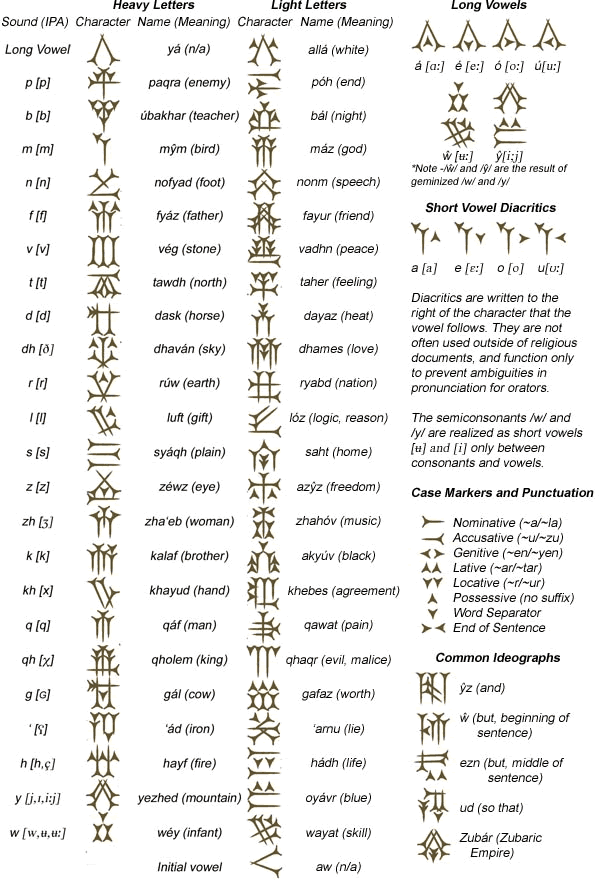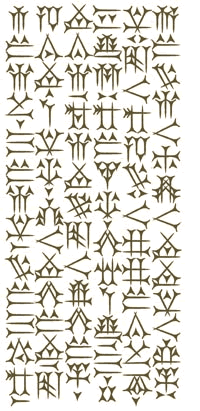
The Zubaric abjad is a cuneiform writing system created by Jason Liekhus, who started work on it in 2006 for use in his constructed world project. The mechanics of the writing system were inspired by the Semitic abjads, and in part by complex writing systems such as Japanese. Its aesthetic qualities are modeled after ancient cuneiform scripts such as Akkadian and Sumerian.
Zubaric cuneiform is used to write Old Zubaric (Nazbur Adyaz), also known as Dyzite Zubaric. The Old Zubaric language is a daughter of Proto-Safritic, a highly inflected language originating in the mountains northwest of the Valley of Zubár. The language was first established in Zubár when the discovery of bronze enabled the Safritic tribal lord Úharammáz to conquer settlements at the mouth of the river Zhwl, where he established the city of Dyz.
Prior to the Safritic conquest Zubár was populated mostly by Oleptites, who were credited with creating the first writing system in the world's history. Oleptic cuneiform was originally a logographic writing system used to write their isolating language. It was later adopted by the Dyzites to represent the phonetic values of their language, thus becoming the first alphabetic writing system. The language of Dyz spread with the political influence of the city, and later came to be known as the Zubaric language. In later times it was maintained as the liturgical and political language of the empire of Zubár.


Qayfn syufra lyusúda 'óz-murudh ku azyzu yz zaáfu gofzaw yz aqhyat hvadh. Doyabdh yahmuvu sawruyen yz ad'elen, ororyánt kyalaf azfa azzar abta.
All human beings are born free and equal in dignity and rights. They
are endowed with reason and conscience and should act towards one another
in a spirit of brotherhood.
(Article 1 of the Universal Declaration of Human Rights)
If you have any questions about the Old Zubaric alphabet, you can contact Jason Liekhus at: ausila@aim.com
Braellaf, Ihathvé Sabethired, Old Zubaric
Constructed scripts for: Ainu | Arabic | Chinese languages | Dutch | English | Hawaiian | Hungarian | Japanese | Korean | Lingala | Malay & Indonesian | Persian | Tagalog / Filipino | Russian | Sanskrit | Spanish | Taino | Turkish | Vietnamese | Welsh | Other natural languages | Colour-based scripts | Tactile scripts | Phonetic/universal scripts | Constructed scripts for constructed languages | Adaptations of existing alphabets | Fictional alphabets | Magical alphabets | A-Z index | How to submit a constructed script
[top]
You can support this site by Buying Me A Coffee, and if you like what you see on this page, you can use the buttons below to share it with people you know.

If you like this site and find it useful, you can support it by making a donation via PayPal or Patreon, or by contributing in other ways. Omniglot is how I make my living.
Note: all links on this site to Amazon.com, Amazon.co.uk
and Amazon.fr
are affiliate links. This means I earn a commission if you click on any of them and buy something. So by clicking on these links you can help to support this site.
[top]